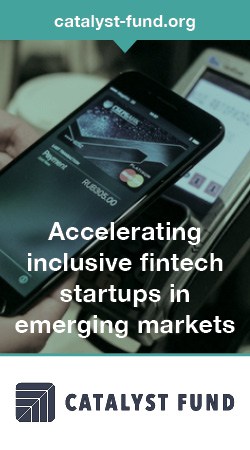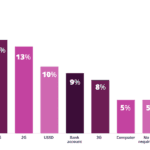Creating an Inclusive Fintech Ecosystem? Here Are Three Facts Accelerators Should Consider
As a global impact accelerator, Catalyst Fund started with one goal: supporting early-stage inclusive fintech entrepreneurs in developing accessible, high-quality and relevant financial solutions for the underserved. After over three years of operations, the accelerator has worked with 20 startups across 13 emerging markets that are creating better credit, payment, insurance, savings and investment solutions that improve the financial health of people with low incomes. The recipe to accelerate them was simple: Connect them to investors to unlock more funding, provide hands-on support tailored to each company’s need to reach product-market fit, and give them flexible capital to test and iterate on their product. Today, the startups have collectively reached over 1.2 million customers and raised $25.7 million from commercial and impact investors. We could not be more proud of them.
With so many accelerators working in the space, we wanted to uncover what about our acceleration model truly contributed to their success. To answer this, we decided to evaluate the program and unveil important “aha!” moments that can help shape other efforts to support emerging market entrepreneurs and foster more inclusive fintech ecosystems:
1) Investors are not just an exit strategy
Investors are more than just open wallets. They are valuable members of the global inclusive fintech community, and can offer important insights from seeing so many innovators in different markets facing the same challenges. So we decided to involve them from the very beginning. Catalyst Fund’s startup sourcing and selection process relied on five rock-star fintech investors: Accion Venture Lab, 500 Startups, Gray Ghost Ventures, Omidyar Network (now Flourish Ventures) and Quona Capital. These investors helped identify and vet promising startups, and once selected, mentored them through the course of the program and sometimes beyond.
“I like that investors are sourcing the startups and identifying potential for investment down the line. The fact that the deals are coming from practitioners is an important filter,” Tahira Dosani, Managing Director, Accion Venture Lab, told us.
Too often, investors are invited to participate only at the end of an acceleration process, sacrificing opportunities to leverage their intuition and knowledge. In our experience, investors can quickly recognize impactful and scalable business models and have a wealth of golden advice on what makes good leadership, how to approach competition and how to prepare for growth. We believe building such investor intimacy from the get-go is a major factor for helping startups raise new rounds, making the program more efficient. For every $1 of capital invested in the program, Catalyst Fund companies raised $8 from investors. We like to believe that beyond selection bias, their involvement had something to do with this.
2) Reaching product-market fit is more than just theory
No matter how developed an acceleration curricula may be, hands-on, practical support, tailored to what each startup needs here and now, goes a long way in helping early-stage startups find product market fit.
Product market fit is a long journey that requires patience, structured thinking, a thorough understanding of the customer and lots of experimentation. This is especially hard in emerging markets, where the solution caters to low-income customers who generally have low trust in digital solutions, might be illiterate and live in remote areas with low connectivity. What matters most in this case is supporting startups to build desirable products that add value to their target customers. This means the solutions have to be appropriate, affordable, and accessible for the user, while the startup also works on developing a sustainable business model. You need to learn by doing.
But when your team consists of two to three people, with strong skills in certain areas and clear weaknesses in others, “getting stuff done” is easier said than done. Across the Catalyst Fund portfolio, we have seen teams with a huge diversity of skillsets. Some had strong business acumen but were not fluent in product management or technical architectures appropriate for their local context, while others were strong in business and technology but lacked the customer-level design skills to craft their product.
A cookie-cutter approach to support them would have never worked. Each type of leader required a slightly different kind of support. Therefore, Catalyst Fund’s support came in various flavors, but always delivered as if our staff became part of the startups’ teams. We helped companies on issues ranging from developing technical product architecture and prototyping, to machine learning algorithms, human-centered design and user research, and behavioral experiments or go-to-market strategies. But every time was a bit different. Needless to say, startups loved the unique attention to their specific issues. These venture building services were the most valued, and startups saw a bump in customer uptake. Yet the numbers say it better than words: 70% of active startups were interested in follow-on support, and some were also willing to pay for it.
Christopher Sheehan, CEO of WorldCover noted: “As a founder, Catalyst Fund has provided me with an invaluable community of like-minded mission-driven founders, who are building the next generation of tech for emerging markets. My team has learned so much about user research and building trust for fintech products. And our customers ultimately are getting a better product because of Catalyst.”
Without hands-on support, we run the risk of learnings remaining theoretical and classroom-level. This would make the startups’ progress slower and our help less pertinent. Unless startups can quickly track and measure progress and assess what is working versus what is not, it would be hard to make the quick fixes needed to get back on track. Similarly, we’ve come to see that such hands-on support helps us understand the startup’s model and challenges more deeply, and helps improve our support with each new cohort of startups.
3) Sharing knowledge makes us stronger
Learn, learn and learn some more: Catalyst Fund’s second mandate is to gather learnings from the ground-up and share them widely to strengthen the fintech ecosystem. Catalyst Fund companies come from four continents and 13 countries, giving it a global perspective and cross-regional experiences. Since its inception, Catalyst Fund has asked the hard questions about fintech, financial inclusion and innovation:
- How can fintech companies benefit low-income consumers through new products, technologies and business models?
- How can startups overcome barriers to growth, such as illiteracy, trust, remoteness, weak infrastructure and connectivity, to reach their target customers?
- How can fintech companies and incumbents partner with each other to enable pathways to scale?
- How can accelerators best support early-stage startups towards reaching product market fit?
We embedded learning questions in every project with the startups, making sure insights were captured on the go. This process focused our attention on distilling learnings that would be helpful to various stakeholders, building our collective knowledge on fintech models that work for the underserved. We produced over 60 learning pieces, developed four practical toolkits for startups, hosted 19 convenings and webinars, and reached fintech communities of investors, startups and funders through events. We influenced the ecosystem by sharing tools, data and knowledge gained from working directly with the frontline innovators globally, making early-stage fintech companies more visible to investors and hopefully inspiring more fintech innovation for financial inclusion.
Yet learning is a life-long journey, and so much more remains to be done to foster inclusive fintech ecosystems. Despite the learning and energy generated, we still see inclusive fintech startups in emerging markets facing numerous challenges. Startups still find that raising capital is the biggest hurdle in these markets. They struggle to find the right talent to support their growth efforts and are limited by the absence of pathways to scale via exits, mergers or acquisitions.
So what’s next for Catalyst Fund? Without a doubt, we will continue to learn about how we can further remove barriers to growth for inclusive fintech startups, and share our take on successes and failures.
In particular, we plan to focus on these four major issues and increase collaborations to solve them:
- Addressing the early-stage funding gap: facilitate matching and partnerships between investors, banks and startups to unlock more capital for early-stage companies and enable pathways to scale
- Putting impact centre-stage: encourage funders and startups to focus on assessing and designing appropriate, affordable and accessible solutions, building a body of knowledge on what makes fintech work for the underserved
- Developing regional ecosystem hotspots: regional support to develop more local entrepreneurs and local ecosystem of startups and investors
- Expand the ecosystem knowledge: continue to share insights from our work so that investors, banks and regulators are equipped with the knowledge and data they need to further inclusive fintech innovation
Finally, as we reflect on our first three years, we realize we need more knowledge builders to help guide the industry and continue to support inclusive fintech efforts.
What were your “aha!” moments? What else could Catalyst Fund do to support our fintech ecosystem? We’d love your ideas. Please connect with us and join us in this learning journey (but first download our evaluation report.) We’re excited to share our insights with the industry and look forward to developing a bigger and better Catalyst Fund.
Maelis Carraro is Deputy Director at BFA.
Rasima Swarup is an Associate at BFA.
Image credit: Paygo Energy
- Tags
- fintech




